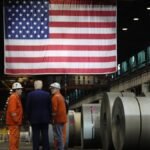As President Donald Trump prepares to announce a new wave of tariff increases, American manufacturers are bracing for the financial fallout. For business owners like Josh Smith, founder of Montana Knife Co., the impact is already painfully clear. Smith recently purchased a $515,000 blade-grinding machine from Germany, which under Trump’s updated trade policies, will now carry an additional $77,250 in import taxes.
Trump’s administration is rolling out tariffs ranging from 15% to 50% on goods from dozens of countries, including key trading partners like the European Union, Japan, and the UK. While the White House insists these tariffs will revive American factory jobs and shrink the budget deficit, many U.S. manufacturers warn that the rising costs could stall wage growth, force layoffs, or even lead to factory closures.
Chris Bangert-Drowns, a researcher at the Washington Center for Equitable Growth, estimates that factory costs could climb by 2% to 4.5% due to the tariffs. “That might seem minor, but for businesses operating on thin profit margins, it could mean wage stagnation or plant shutdowns,” Bangert-Drowns explained.
The political gamble is clear: Trump aims to portray these tariffs as a win for American strength on the global stage, but the real test will be whether factory towns see a resurgence and whether everyday Americans feel economically secure.
For Smith, the dilemma is immediate and frustrating. “I would love to buy American-made grinding machines, but they don’t exist,” he said. “Only two companies in the world make them, and both are in Germany.” As a result, the machine’s new 15% import tax represents a cost that could have funded a new hire at his company.
Smith’s challenges echo across American manufacturing. Trump has imposed 50% tariffs on imported steel and aluminum, which has given U.S. steelmakers the opportunity to raise domestic prices. Justin Johnson, president of Jordan Manufacturing Co. in Michigan, says his company has seen the price of steel coil rise between 5% and 10% this year. “There’s no capitalist who wouldn’t raise prices when competition is crippled,” Johnson said.
Despite Trump’s assertion that tariffs are not fueling inflation, businesses on the ground report rising costs. A recent survey by the Atlanta Federal Reserve found that companies expect to pass on at least half of the tariff-related expenses to consumers through higher prices. Moreover, Labor Department data shows that the U.S. lost 14,000 manufacturing jobs after Trump announced his initial tariff hikes in April.
In key swing states like Michigan and Wisconsin, more than 20% of jobs are tied to industries vulnerable to these tariffs, including manufacturing, construction, mining, and oil drilling. Even sectors Trump has hailed as the future, like artificial intelligence and advanced electronics, are heavily dependent on imported components, with over 20% of inputs sourced globally.
The White House argues that new trade frameworks will open markets for American businesses and reassert the global dominance of the “Made in USA” label. “Under President Trump, ‘Made in USA’ is set to resume its global dominance,” White House spokesman Kush Desai said.
Yet, the reality remains murky. Treasury Secretary Scott Bessent recently stated that foreign nations are willing to pay tariffs to retain access to the U.S. market. However, this toll is also being shouldered by American manufacturers, many of whom are already feeling the financial strain.
Smith, a Trump supporter himself, finds it ironic that policies intended to bolster American manufacturing are putting added stress on small and medium-sized businesses like his. After a key U.S. steel supplier, Crucible Industries, filed for bankruptcy, Smith had to source his specialty steel from Sweden, which is now also facing a 50% import duty starting in 2026.
To buffer against the immediate impact, Smith stockpiled a year’s worth of steel in advance. Still, he worries about the long-term viability of his business model if such tariffs continue. “I’m sitting here looking at numbers every day, deciding whether we can hire more people or invest in more equipment,” Smith said. “These tariffs make those decisions harder.”
While Trump maintains that tariffs will rejuvenate American industry without inflating prices, economists like Ernie Tedeschi from Yale University suggest otherwise. According to Tedeschi, American households could lose up to $2,400 annually due to tariff-driven cost increases.
As the administration presses forward with its tariff strategy, companies like Montana Knife Co. are caught in the middle—trying to grow, hire, and innovate, while bracing for the next wave of costs.
















So no one in America can make a grinder for knife sharpening? I’m not buying this one
If it’s so easy, why don’t you go start a business making extremely specialized, $500,000 machines? Be sure to post an update, I’d love to hear about how spectacularly you fail
Yes. We offshored those equipment manufacturers and sent their manufacturing equipment overseas in the 90’s. We can’t make the precision bearings, the motor or cast the machine frames anymore. We are just a nation of consumers. We don’t manufacture, we assemble from imported parts. Companies from India make better tractors now than any American company can produce. India. Let that sink in. India is a better manufacturer than the US.
That’s because your an idiot Joe. Machines are often made out of hundreds of parts that need to be cast specifically for that product. Those parts need to be designed, prototyped (unless you steal the IP), you also need a machine to make everything, hire skilled workers, on, and on. So no Joe you can’t just make this especially in America where the cost is going to be three times buying it from Germany. It’s not something you can just order… Oh wait… You can… Just pay the tax I guess.
The Problem is not that no one can make those. But if you want the best machines to make a top product then you buy German Machines. In terms of machin quality, durability and peices per hour. There is a reason that this machine cost moe then 500,000 USD.
Why don’t you make a grinder for knife sharpening then buddy?
WE PAY THE TARIFFS! Us. The companies and citizens of the United States!
“Treasury Secretary Scott Bessent recently stated that foreign nations are willing to pay tariffs to retain access to the U.S. market.”
It’s not that no one can make one Joe. They just don’t make them. Can’t buy what doesn’t exist. Is this really that hard to understand? Anyways it sounds like we’re still not great yet.
It’s a half-million-dollar grinding machine — not just “a grinder”.
Well make one and sell it. Let’s see how hard it is for you bud.
Sounds like the owner was stabbed in the back